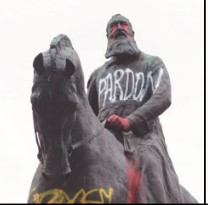Postcolonial entanglements between public memory practices in Belgium by Afrodescendant activists and Gothic literature depictions of Jamaican slavery and rebellion
Postcolonial Entanglements is a Research unit under Cultural Transformations research programme
Info about event
Time
Location
Nobelparken, Building 1481, Room 262

Postcolonial Entanglements is delighted to invite you to an event on the postcolonial entanglements between public memory practices in Belgium by Afrodescendant activists and Gothic literature depictions of Jamaican slavery and rebellion:
Eline Mestdagh, Ghent University, and
Stephanie Volder, Aarhus University, will present their PhD research:
Studying the rise of Memory Activism in Postcolonial Belgium in its Manifold Manifestations: Notes from the Field
Since 2010, the public debate on how Belgium should deal with the legacies of its colonial past has been livelier than ever. Partly responsible for that is the emergence of a strong group of Afrodescendant activists who, through a series of strategic and public memory practices, are challenging hegemonic discourses on Belgium's colonial past. As such, they fit the definition of 'memory activism', a term that has recently gained much traction within the broader field of Memory Studies. By bringing the study of collective memory and the study of social movements together, memory activism scholars seek, among other things, to understand the relationship between mnemonic change and social change. In this presentation, I discuss, firstly, how postcolonial memory activism has historically emerged in Belgium, and, secondly, how the link between mnemonic change and social change is articulated by different Afrodescendant memory activists themselves in different campaigns and in negotiation with official authorities. The presentation concludes with a methodological reflection. Considering the growing body of literature of memory activism as indicative of a shift in memory research from a focus on representations of memory to the actors of memory, I ask which methodologies we can employ for this research agenda, reflecting on the challenges that they bring along.
Gothic slavery: reading Jamaican slavery and rebellion in the early nineteenth century
The presentation asks how Gothic depictions of Jamaican slavery and rebellion played into the development of modern racism in the early nineteenth century by racialising revolutionary violence. As a response to the revolutionary turmoil in Europe and the Atlantic world in the Age of Revolution (1789-1848), literature on slavery increasingly represented the enslaved people in the British sugar colonies as bloodthirsty savages in need of civilising measures as well as a moral, religious, and economic education. Through the recurring literary topoi of the Gothic – claustrophobic spaces, terrifying landscapes, imprisonment, demonic villains, persecuted innocence, and supernatural hauntings – literature on Jamaican slavery sought to persuade readers to imagine the future of slavery as either the gradual emancipation of the enslaved people or the amelioration of the system from within through social reform and the “improvement” of plantation and people. I argue that the literary strategy of demonising racial difference had severe consequences for the time that came after emancipation and the general transition from slavery into “free” labour
